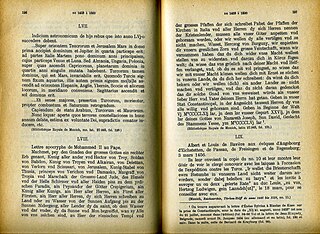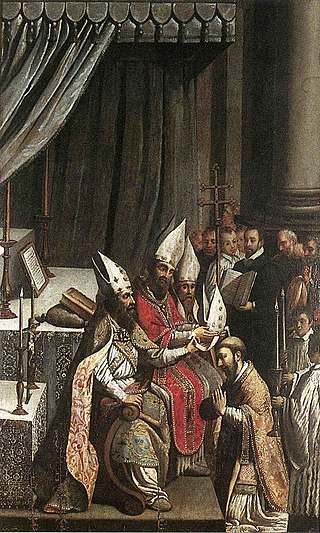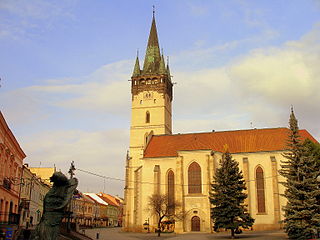Alphabetical list of Protestantism-related articles on English Wikipedia .
Contents
| Part of a series on |
| Protestantism |
|---|
 |
| |
Alphabetical list of Protestantism-related articles on English Wikipedia .
| Part of a series on |
| Protestantism |
|---|
 |
| |

Apocrypha are biblical or related writings not forming part of the accepted canon of Scripture. While some might be of doubtful authorship or authenticity, in Christianity, the word apocryphal (ἀπόκρυφος) was first applied to writings which were to be read privately rather than in the public context of church services. Apocrypha were edifying Christian works that were not considered canonical scripture. It was not until well after the Protestant Reformation that the word apocrypha was used by some ecclesiastics to mean "false," "spurious," "bad," or "heretical."

Apostolic succession is the method whereby the ministry of the Christian Church is considered by some Christian denominations to be derived from the apostles by a continuous succession, which has usually been associated with a claim that the succession is through a series of bishops. Those of the Anglican, Church of the East, Eastern Orthodox, Hussite, Moravian, Old Catholic, Oriental Orthodox, Catholic and Scandinavian Lutheran traditions maintain that "a bishop cannot have regular or valid orders unless he has been consecrated in this apostolic succession". These traditions do not always consider the episcopal consecrations of all of the other traditions as valid.

Recusancy was the state of those who remained loyal to the Catholic Church and refused to attend Church of England services after the English Reformation.
The Reformation, also known as the Protestant Reformation and the European Reformation, was a major theological movement in Western Christianity in 16th-century Europe that posed a religious and political challenge to the papacy and the authority of the Catholic Church. Following the start of the Renaissance, the Reformation marked the beginning of Protestantism.
Sola scriptura is a Christian theological doctrine held by most Protestant Christian denominations, in particular the Lutheran and Reformed traditions, that posits the Bible as the sole infallible source of authority for Christian faith and practice. The Catholic Church considers it heterodox and generally the Orthodox churches consider it to be contrary to the phronema of the Church.
The Counter-Reformation, also sometimes called the Catholic Revival, was the period of Catholic resurgence that was initiated in response to, and as an alternative to, the Protestant Reformations at the time. It began with the Council of Trent (1545–1563) and largely ended with the conclusion of the European wars of religion in 1648. The similar term Catholic Reformation may also encompass reforms and movements within the Church in the periods immediately before Protestantism or Trent.
Restorationism, also known as Restitutionism or Christian primitivism, is a religious perspective according to which the early beliefs and practices of the followers of Jesus were lost or adulterated after His death and required "restoration". It is a view that often "seeks to correct faults or deficiencies by appealing to the primitive church as normative model".
The following outline is provided as an overview of and topical guide to Christian theology:
In Christian eschatology, historicism is a method of interpretation of biblical prophecies which associates symbols with historical persons, nations or events. The main primary texts of interest to Christian historicists include apocalyptic literature, such as the Book of Daniel and the Book of Revelation. It sees the prophecies of Daniel as being fulfilled throughout history, extending from the past through the present to the future. It is sometimes called the continuous historical view. Commentators have also applied historicist methods to ancient Jewish history, to the Roman Empire, to Islam, to the Papacy, to the Modern era, and to the end time.

The Protestant Reformation during the 16th century in Europe almost entirely rejected the existing tradition of Catholic art, and very often destroyed as much of it as it could reach. A new artistic tradition developed, producing far smaller quantities of art that followed Protestant agendas and diverged drastically from the southern European tradition and the humanist art produced during the High Renaissance. The Lutheran churches, as they developed, accepted a limited role for larger works of art in churches, and also encouraged prints and book illustrations. Calvinists remained steadfastly opposed to art in churches, and suspicious of small printed images of religious subjects, though generally fully accepting secular images in their homes.

Propaganda during the Reformation, helped by the spread of the printing press throughout Europe and in particular within Germany, caused new ideas, thoughts, and doctrines to be made available to the public in ways that had never been seen before the sixteenth century. The printing press was invented in approximately 1450 by Johan Gutenberg, and quickly spread to other major cities around Europe; by the time the Reformation was underway in 1517 there were printing centers in over 200 of the major European cities.
Methodism has historically followed the Protestant tradition of referring to sanctified members of the universal church as saints. However, as a title, Saint is typically prefixed to the names of biblical figures, and pre-Reformation Christians, especially martyrs of the faith. While most Methodist churches place little emphasis on the veneration of saints, they often admire, honor, and remember the saints of Christendom.

In 16th-century Christianity, Protestantism came to the forefront and marked a significant change in the Christian world.

The following outline is provided as an overview of and topical guide to Christianity:

Protestantism is a branch of Christianity that follows the theological tenets of the Protestant Reformation, a movement that began in the 16th century with the goal of reforming the Catholic Church from perceived errors, abuses, and discrepancies.

Cessationism versus continuationism involves a Christian theological dispute as to whether spiritual gifts remain available to the church, or whether their operation ceased with the Apostolic Age of the church. The cessationist doctrine arose in the Reformed theology: initially in response to claims of Roman Catholic miracles. Modern discussions focus more on the use of spiritual gifts in the Pentecostal and Charismatic movements, though this emphasis has been taught in traditions that arose earlier, such as Methodism.

The Reformation in Sweden is generally regarded as having begun in 1527 during the reign of King Gustav I of Sweden, but the process was slow and did not end definitively until the Uppsala Synod of 1593 and the following War against Sigismund, with an attempted counter-reformation during the reign of John III (1568–1592).
Historicism is a method of interpretation in Christian eschatology which associates biblical prophecies with actual historical events and identifies symbolic beings with historical persons or societies; it has been applied to the Book of Revelation by many writers. The Historicist view follows a straight line of continuous fulfillment of prophecy which starts in Daniel's time and goes through John of Patmos' writing of the Book of Revelation all the way to the Second Coming of Jesus Christ.

Criticism of Protestantism covers critiques and questions raised about Protestantism, the Christian denominations which arose out of the Protestant Reformation. While critics may praise some aspects of Protestantism which are not unique to the various forms of Protestantism, Protestantism is faced with criticism mainly from the Catholic Church and the Eastern Orthodox Church, although Protestant denominations have also engaged in self-critique and criticized one another. According to both the Catholic Church and Eastern Orthodoxy, many major, foundational Protestant doctrines have been officially declared heretical.

Wesley Church is one of the oldest churches in Egmore area of Chennai, the capital of the South Indian state of Tamil Nadu. The original structure was built in Gothic architecture in 1903 by Wesleyan Mission. It was constructed at Egmore considering the growing needs of it in the area around Egmore. The church is named after John Wesley, the founder of Methodist Movement in 140 countries.